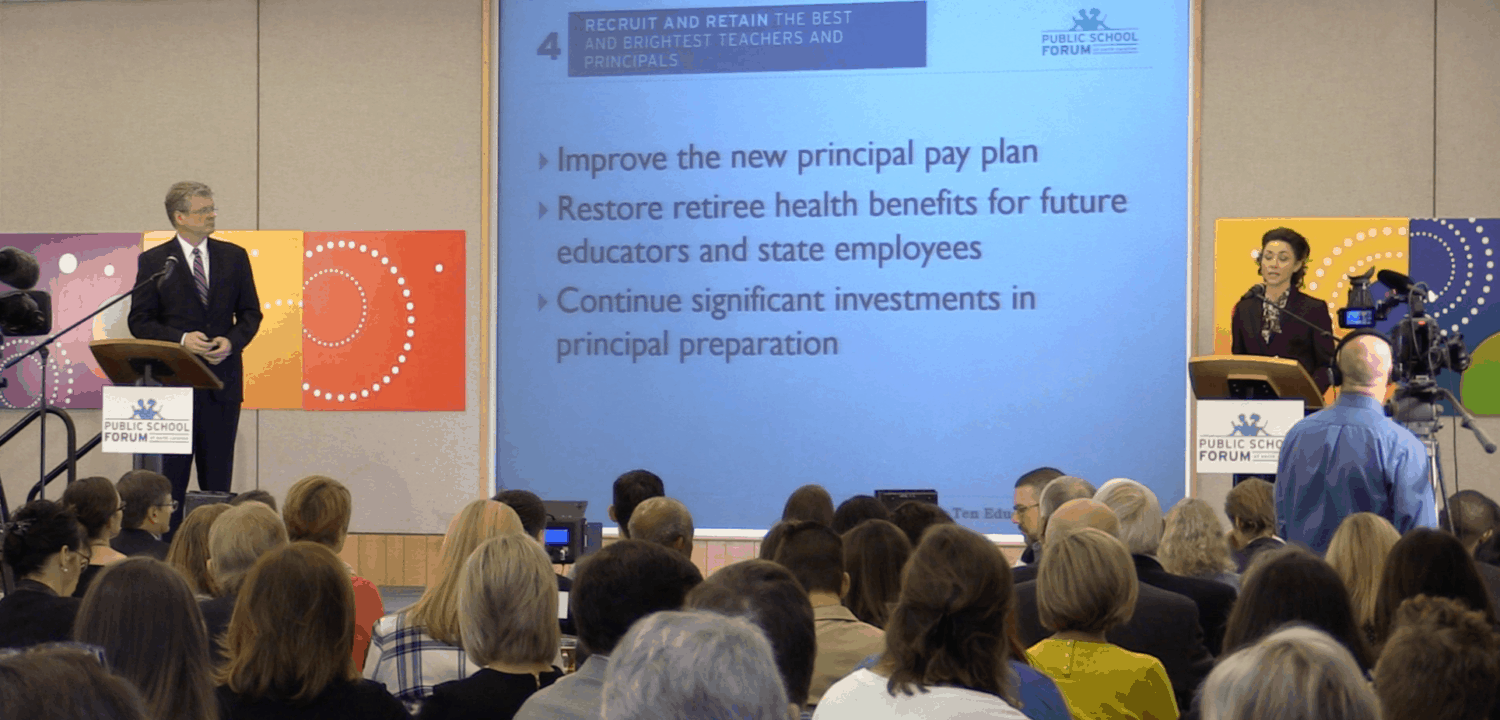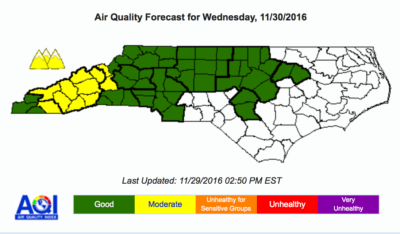The Public School Forum of North Carolina unveiled its top 10 education issues of 2018 in Raleigh Wednesday.
As part of its annual Eggs & Issues event, Keith Poston, president and executive director of the Public School Forum, and Rachel Beaulieu, the Forum’s senior policy advisor, presented the 10 issues before a live-taping of the Forum program Education Matters.
Public School Forum of North Carolina’s Top 10 Education Issues for 2018
1. Provide Certainty for Students, Parents and All Educators by Fixing the Class Size Crisis
2. Adequately and Equitably Invest in Our Children’s Education, Including Their School Buildings
3. Insist on Transparency & Accountability for School Choice Programs
4. Recruit and Retain the Best and Brightest Teachers and Principals
5. Once Again, Fix the Faulty A-F School Grading System
6. Scale Up Successes for Our State’s Struggling Schools
7. Adopt a Whole Child Approach to Health and Learning
8. Pursue Outcomes-Focused Strategies Toward Racial Equity
9. Keep Building Upon North Carolina’s Investments in Early Childhood Education
10. For Those Who Govern Our State’s Public Schools, Do It Well (And Together)
See the full presentation below.
The Education Matters taping featured a panel of four guests discussing topics such as racial equity, the K-3 class size mandate, the teacher pipeline, and school choice. The panelists were:
- Sen. Valerie Foushee (D-Chatham, Orange)
- Rep. Craig Horn (R-Union)
- Lisa Godwin, 2017 NC Teacher of the Year
- Sepi Saidi, President & CEO, SEPI Engineering
Below see previews from the Education Matters taping.
Class size mandates
Teacher pipeline
School choice
Also listen to a podcast with Poston previewing Eggs & Issues.
The Forum released the following press release about the event.
RALEIGH, NC (January 24, 2018) – The Public School Forum of North Carolina released its Top 10 Education Issues for 2018 today during its fourth annual Eggs & Issues Breakfast in Raleigh, where the Forum’s Executive Director, Keith Poston, declared the K-3 class size mandate and school funding among the most pressing issues facing North Carolina schools for 2018.
“Forecasting what will be the top education issues in any given year can a tricky business and last year we whiffed on the K-3 class size mandate because we anticipated a quick resolution,” Poston said. “This year it’s the top issue on our list as school districts across the state are scrambling to meet the General Assembly’s mandate to lower class sizes, while at the same time trying to protect thousands of art, music and PE teachers and create hundreds of new classrooms.”
In its list, the Public School Forum also urged state leaders to focus on both adequacy and equity in funding for the state’s public schools.
“We believe school finance reform presents a real opportunity for positive change, as long as adequacy and equity are central tenets to address the chronic and growing divide between urban and rural, wealthy and poorer school systems.” Poston said. “Where children are born should not determine the educational opportunities available to them.”
Biogen was the Presenting Sponsor and RTI International was the Pacesetter Sponsor for the event. Public School Forum President and Executive Director Keith Poston and Rachel Beaulieu, the Forum’s Senior Policy Advisor, presented the Top Ten Education Issues to more than 225 business, education and government leaders. The full publication and list can be downloaded at https://www.ncforum.org/category/publications/research/top-ten-education-issues/.
The event also included a live taping of the Forum’s weekly television show, Education Matters, which will air January 27-28 on WRAL-TV, FOX 50 and UNC –TV’s NC Channel. Panelists who discussed top education issues included Sen. Valerie Foushee (D-Chatham, Orange); Rep. Craig Horn (R-Union), Lisa Godwin, 2017 NC Teacher of the Year; and Sepi Saidi, President & CEO, SEPI Engineering. Poston moderated the panel.
The Public School Forum highlighted the General Assembly’s investments in teacher pay over the last few years and urged lawmakers to continue to build on those investments. Principal pay increases were also cited as a welcome and much needed boost; however, the Public School Forum did urge legislators to re-visit the new principal pay plan.
“The new principal pay plan creates winners and losers with an estimated 1 in 6 principals actually seeing a pay cut next year unless the plan is changed or a hold-harmless provision is extended,” Poston said. “With already high turnover in North Carolina for school administrators, we can ill afford to push some of our most experienced school leaders out the door.”
Last year the Public School Forum called for the creation of a new teacher scholarship program to replace the NC Teaching Fellows Program that was eliminated by the NC General Assembly in 2011—and a promising new NC Teaching Fellows Program was launched in the fall. This year the Forum urges the state to expand the program and include some of our state’s Historically Black Colleges and Universities (HBCUs) to the effort.
“We hope lawmakers will devote the resources necessary to this program so that it can expand overall as well as better recruit prospective teachers of color that our public schools and students desperately need.” Poston said.
The Public School Forum once again addressed the need for much greater accountability in school choice alternatives like private school vouchers. The report notes that private school vouchers saw continued support by state lawmakers, moving them forward on a path to spend $1 billion on the program over a ten-year period, while efforts to increase transparency and accountability for the program failed.
“There were attempts to add more accountability to the Opportunity Scholarship Program, but those efforts failed despite the fact the largest recipient of private school vouchers became ensnared in an embezzlement scandal,” said Poston. “Amazingly, the culprit continues to teach at Trinity Christian School in Fayetteville while completing a jail sentence on the weekends.”
“There seems to be little interest in the General Assembly to investigate, despite the fact the voucher school receives approximately two thirds of its revenues from North Carolina taxpayers,” Poston added. “We need to do better.”





